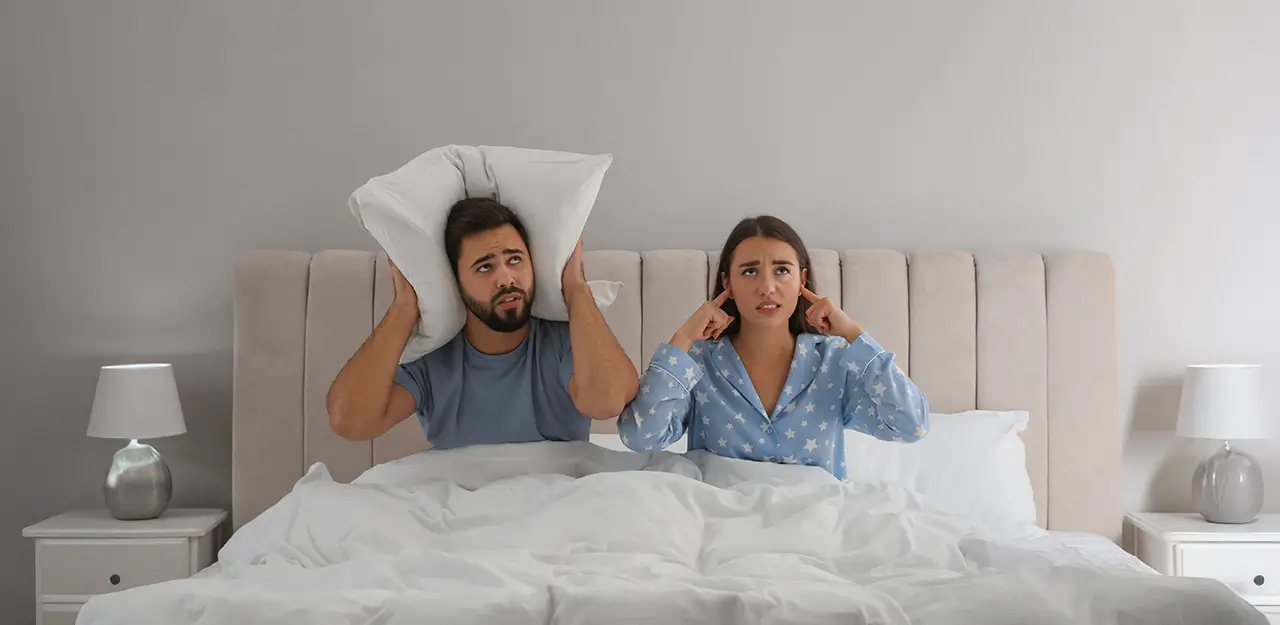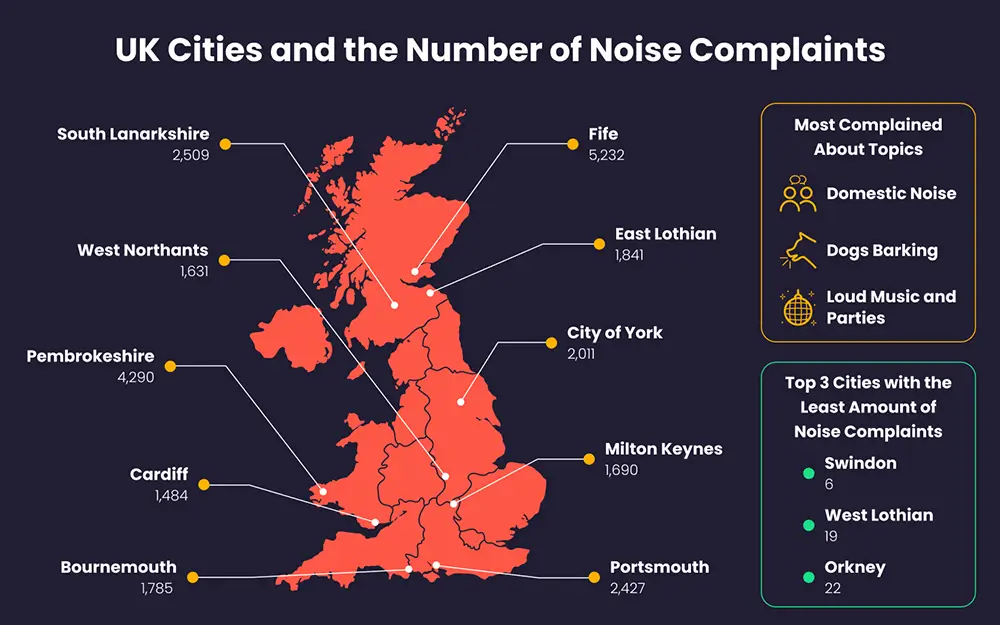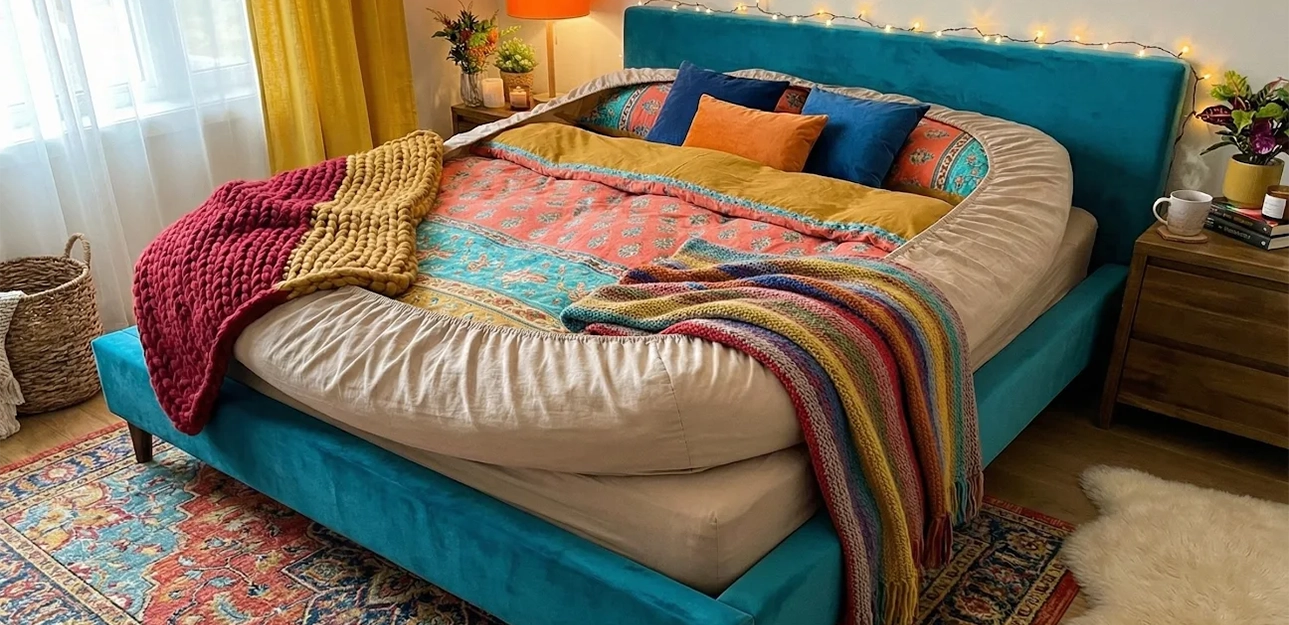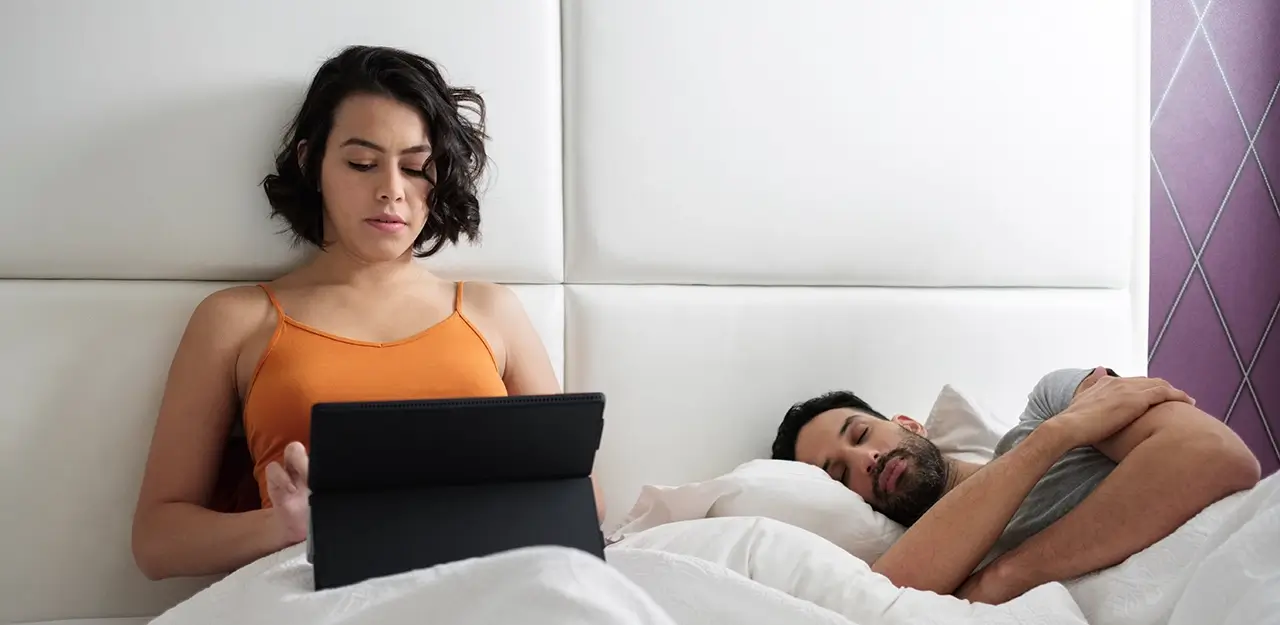
Kept up at night? You’re not alone! Here’s where the most noise complaints are in Britain
Struggling to nod off because of noisy neighbours or barking dogs? You’re definitely not alone. Our new research has revealed which parts of the British Isles are the noisiest when it comes to sleep disruption – and which lucky regions are enjoying some peace and quiet.
Noise pollution doesn’t just make it harder to fall asleep, it can also affect the quality of the sleep you do get. That means lighter, more fractured rest – and less of the deep, restorative sleep that helps you wake up feeling refreshed.
So, where are the noisiest (and quietest) places to try to get some shut-eye?
The British Isles noisiest areas for sleep
According to Freedom of Information data analysed by our sleep experts, residents in some areas are losing far more sleep than others:
| Rank | City/Council | Number of Noise Complaints (2024) |
| 1 | Fife | 5,232 |
| 2 | Pembrokeshire | 4,290 |
| 3 | South Lanarkshire | 2,509 |
| 4 | Portsmouth | 2,427 |
| 5 | City of York | 2,011 |
| 6 | East Lothian | 1,841 |
| 7 | Bournemouth | 1,785 |
| 8 | Milton Keynes | 1,690 |
| 9 | West Northants | 1,631 |
| 10 | Cardiff | 1,484 |
Scotland may often be seen as a place of escapism and tranquility, but it turns out that some of Scotland’s residents are anything but. Fife tops the list, with over 5,200 noise complaints recorded in 2024 – many of them relating to domestic noise, loud music and late-night parties. Pembrokeshire follows closely behind, with a staggering 58% of its complaints linked to animal noise. Meanwhile, South Lanarkshire rounds out the top three, where barking dogs and household noise have been the main culprits of sleepless nights.
The quietest spots for a peaceful night’s sleep across Britain
If you’re craving peace and quiet, you might want to move to Swindon, where just six noise complaints were filed all year. Other peaceful areas include West Lothian, Orkney, and Halton Borough, proving that quieter corners of the UK still exist.
| Rank | City/Council | Number of Noise Complaints (2024) |
| 1 | Swindon | 6 |
| 2 | West Lothian | 19 |
| 3 | Orkney | 22 |
| 4 | Halton Borough | 24 |
| 5 | Aberdeenshire | 35 |
| 6 | Gwynedd | 38 |
| 7 | North East Lincolnshire | 41 |
| 8 | North Lincolnshire | 43 |
| 9 | Perth & Kinross | 46 |
| 10 | Dumfries & Galloway | 62 |

Why noise can ruin your sleep
Even if you don’t fully wake up, environmental noise can trigger the release of hormones such as adrenaline, making it harder to fall into deeper sleep stages. That’s why noisy environments often leave people feeling groggy and unrested, even after a ‘full’ night in bed.
And as Google searches for ‘can’t sleep’ and ‘noise complaint’ related terms are rising across Britain, it’s clear that sleep disruption is becoming a growing concern1.
How to sleep when it’s noisy
Hannah Shore, our head of sleep science, has some expert advice on dealing with noise and disrupted sleep:
“Disturbed sleep will mean you get less amount of sleep but can also affect your sleep architecture, meaning the type of sleep you are getting. Normally it means getting lighter and more fractured sleep, and not enough of the deeper restorative sleep. Basically this will leave you feeling rubbish the following day.”
Here are Hannah’s top tips for sleeping soundly, even when your surroundings are less than peaceful:
- Invest in good earplugs or noise-cancelling headphones. Drown out unpredictable sounds with white noise, podcasts, or calming music.
- Rearrange your bedroom. Placing larger furniture against shared walls and using soft furnishings like curtains and rugs can help absorb sound.
- Change rooms if possible. If you have a quieter spare room, it might be worth swapping for a few nights’ better rest.
- Stay calm if you wake up. Try not to check the clock – stress hormones can make it harder to drift off again. Instead, do something soothing, like reading or meditation, until you feel sleepy.
- Take a short nap the next day. If you’ve had a rough night, a 20-30 minute nap in the early afternoon can help you recover without affecting the following night’s sleep.
And if the noise is constant, a polite conversation with your neighbour might be all that’s needed – they may not even realise how loud they’re being.
Noise is one of the most common (and frustrating) causes of poor sleep for people all over the world. But with the right approach – and a couple of adjustments to your environment – you can minimise its effects and give yourself the best chance of a restful night.
After all, great sleep isn’t just about the perfect mattress. It’s about creating a calm, comfortable space that lets your mind and body truly switch off.
For more sleep advice, visit our Advice Hub.
References
- Google searches - last 30 days - 08.10.2025
Methodology
A Freedom of Information (FOI) request was sent to all British councils to disclose the number of noise complaints each received from 1 January 2024 to 31 December 2024. The data was collected and analysed to reveal the areas with the most complaints.
About our Team
PR professional and ex-broadcast reporter, Sharon combines 20 years of experience to highlight a wide variety of lifestyle topics related to sleep and wellbeing.
A University of Oxford-trained sleep specialist and published researcher, Hannah's dedicated to improving your sleep through evidence-backed advice and product insights.
Related Articles
TikTok’s “Potato Bed” trend is blowing up – but can it actually help you sleep?
Sales Enquiries
Mon-Sat: 9:30am - 5:30pm
Sunday: 10am - 4pm
Customer Service
Mon-Sat: 09:30am - 17:30pm
Sunday: Closed
customerservice@mattressonline.co.uk












